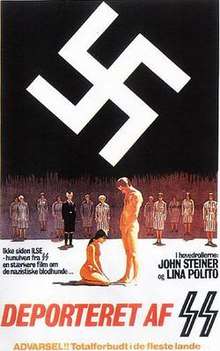Deported Women of the SS Special Section
Le deportate della sezione speciale SS (internationally released as Deported Women of the SS Special Section, SS Special Section Women and Deported Women) is a 1976 erotic-drama film directed by Rino Di Silvestro. The film is considered the first Italian nazisploitation film, after the "auteur" progenitors such as Liliana Cavani's art film Il portiere di notte and Tinto Brass' exploitation film Salon Kitty.[1]
| Deported Women of the SS Special Section | |
|---|---|
 Danish theatrical poster | |
| Directed by | Rino Di Silvestro (as Alex Berger) |
| Produced by | Giuseppe Zaccariello |
| Written by | Rino Di Silvestro |
| Starring | John Steiner Lina Polito Erna Schurer Sara Sperati |
| Music by | Stelvio Cipriani |
| Cinematography | Sergio D'Offizi |
| Edited by | Romeo Ciatti |
| Distributed by | Italian Stallion Productions (US, dubbed) |
Release date |
|
Running time | 98 minutes |
| Country | Italy |
| Language | Italian |
Plot
In Nazi Germany, a group of female prisoners are transported by train to an SS concentration camp and subjected to torture by the camp commandant (John Steiner) and his guards which include a lesbian warden. There is also a joint suicide by cyanide capsule of a guard and his inmate lover upon discovery rather than face public humiliation. Meanwhile the commandant develops an infatuation with a particular inmate, Tanya Noble, who he was in love with before the war and who rejected him.in favor of another man, who is later murdered on the orders of the commandant. After initially attempting to starve herself, she feigns falling in love with him. However, following an evening together in the commandant's bedroom, he reveals his plan to escape to South America and in an act of revenge, Tanya severs his manhood using a hidden razor blade in her vagina during their love making. During the film's climax whilst allowing the other inmates to escape, she guns down a group of SS guards, only to then be shot herself by one of the fatally wounded guards.
Cast
- John Steiner: Herr Erner
- Lina Polito: Tania Nobel
- Erna Schürer: Kapo Helga
- Sara Sperati: Monique DuPré
- Solvi Stubing: Fräulein Greta
- Guido Leontini: Dobermann
- Stefania D'Amario: Angela Modena
- Rik Battaglia: Soldier Fredrick
See also
References
- Marco Giusti. Dizionario dei film italiani stracult. Sperling & Kupfer, 1999.